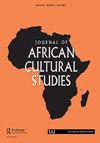Reading Dina Ligaga’s Women, Visibility and Morality in Kenyan Popular Media From Nigeria
IF 0.7
2区 社会学
Q2 CULTURAL STUDIES
引用次数: 1
Abstract
Straddling the fields of gender, media and linguistic studies,Women, Visibility and Morality in Kenyan Popular Media engages with the media representation of an “ideal” woman in Kenya. Dina Ligaga renders a textual analysis of what it takes to be a woman in contemporary Kenya within the context of the cultural, political and secular prejudices with which Kenyan women grapple. Drawing from a large body of data mined from various media sources, digital, print and radio, the author has been able to cleverly utilise the data to present her arguments. The book thus not only provides a template for gathering and analysing data from the media, but also represents adequate evidence that too much data does not always make research clumsy – it enriches research by providing different perspectives on the research arguments. Though the book is about Kenyan women and their portrayal in public spaces and popular culture, Ligaga’s findings mirror similar situations in other African locations. The 2019 BBC documentary on sexual harassment in Nigerian and Ghanaian universities has opened the eyes of the public to the circumstances and spaces (such as the so-called Cold Room at the University of Lagos) where sexual violence regularly takes place. The Nigerian digital media has been agog with narratives of sexual harassment in Nigerian universities; new media framing of this phenomenon sometimes contributes to gendered stereotypical representations of females in its portrayal of women as willing accomplices. Despite the availability of data on debates and narratives about the issue of sexual harassment in Nigerian universities, academic research on it is quite scarce – Nigerian scholars seem to be neglecting this scourge at the detriment of the female students. But in a从尼日利亚读迪娜·利加加的《女性、可见性和道德》
《肯尼亚大众媒体中的女性、可见性和道德》横跨性别、媒体和语言研究领域,致力于肯尼亚“理想”女性的媒体形象。Dina Ligaga在肯尼亚女性所面临的文化、政治和世俗偏见的背景下,对当代肯尼亚女性的身份进行了文本分析。作者从数字、印刷品和广播等各种媒体来源挖掘的大量数据中,巧妙地利用这些数据来陈述自己的论点。因此,这本书不仅为收集和分析来自媒体的数据提供了一个模板,而且提供了充分的证据,证明过多的数据并不总是会使研究变得笨拙——它通过对研究论点提供不同的视角来丰富研究。尽管这本书讲述的是肯尼亚女性及其在公共场所和流行文化中的形象,但利加加的发现反映了其他非洲地区的类似情况。2019年英国广播公司关于尼日利亚和加纳大学性骚扰的纪录片让公众看到了性暴力经常发生的环境和空间(比如拉各斯大学所谓的冷藏室)。尼日利亚数字媒体一直充斥着关于尼日利亚大学性骚扰的报道;新媒体对这一现象的描述有时会助长对女性的性别刻板印象,将女性描绘成自愿的帮凶。尽管有尼日利亚大学关于性骚扰问题的辩论和叙述的数据,但关于这一问题的学术研究却相当匮乏——尼日利亚学者似乎忽视了这一祸害,损害了女学生的利益。但在
本文章由计算机程序翻译,如有差异,请以英文原文为准。
求助全文
约1分钟内获得全文
求助全文
来源期刊

Journal of African Cultural Studies
Multiple-
CiteScore
1.70
自引率
10.00%
发文量
13
期刊介绍:
The Journal of African Cultural Studies publishes leading scholarship on African culture from inside and outside Africa, with a special commitment to Africa-based authors and to African languages. Our editorial policy encourages an interdisciplinary approach, involving humanities, including environmental humanities. The journal focuses on dimensions of African culture, performance arts, visual arts, music, cinema, the role of the media, the relationship between culture and power, as well as issues within such fields as popular culture in Africa, sociolinguistic topics of cultural interest, and culture and gender. We welcome in particular articles that show evidence of understanding life on the ground, and that demonstrate local knowledge and linguistic competence. We do not publish articles that offer mostly textual analyses of cultural products like novels and films, nor articles that are mostly historical or those based primarily on secondary (such as digital and library) sources. The journal has evolved from the journal African Languages and Cultures, founded in 1988 in the Department of the Languages and Cultures of Africa at the School of Oriental and African Studies, London. From 2019, it is published in association with the International African Institute, London. Journal of African Cultural Studies publishes original research articles. The journal also publishes an occasional Contemporary Conversations section, in which authors respond to current issues. The section has included reviews, interviews and invited response or position papers. We welcome proposals for future Contemporary Conversations themes.
 求助内容:
求助内容: 应助结果提醒方式:
应助结果提醒方式:


